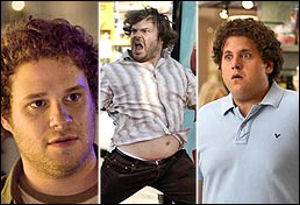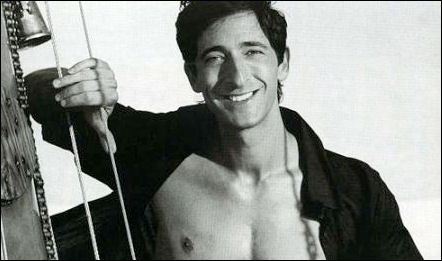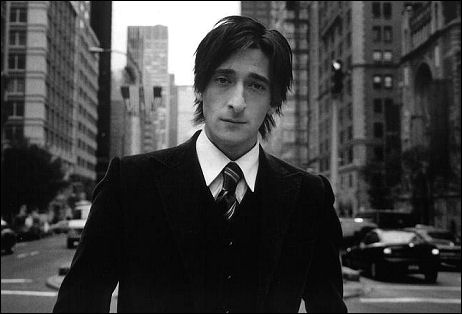Politico‘s Jeff Ressner has posted a roster of ten younger Hollywood heavyweights (i.e., younger than old-guard Hollywood liberals like David Geffen, Mike Ovitz, Stanley Sheinbaum, Norman Lear, etc.) who constitute a “newer army of Hollywood political heavyweights… mostly unknown showbiz executives in Los Angeles [who are] working behind the scenes in left-leaning politics: hosting Democratic Party fundraisers, sponsoring anti-war rallies, organizing abortion rights events, backing environmental legislation or producing message movies that promote peace, love and understanding.”
The “Tinseltown Ten,” he proclaims, are (1) Sony Pictures chairman and CEO Michael Lynton; (2) Wild Brain CEO Charles Rivkin, (3) Star Trek director and Cloverfield producer J.J. Abrams; (4) Rhino Records co-founder Richard Foos; (5) producer Lawrence Bender; (6) producer and “viral video campaign” orchestrator Julie Bergman; (7) Marvel Enterprises COO and Brave New Films co-founder Rick Jacobs; (8) Participant Media’s Jeff Skoll; (9) agent Ari Emanuel; and (10) former actress, philanthropist and networker Heather Thomas.
Hottie-Galumph Redux
The Calgary Sun‘s Kevin Williamson posted an article today (both on the Sun‘s website and on Canoe Jam) about the Judd Apatow myth-fantasy of hotties being attracted to and going out with galumphs, and he quoted yours truly as follows:

“This is all Judd reliving the dynamics of his marriage. I think everyone knows down deep that…birds of a feather flock together. It’s very unusual for hotties to be with galumphs. Ask anybody. The only reason it happens, and it’s the same in this town as it is in New York and elsewhere, is that the guys are very witty, which women love and find sexy, but also very loaded and have connections.
“Seth Rogen in real life is a hip, smart guy. But he’s playing slackers who wear Cabo San Lucas T-shirts and smoke doobies, and that doesn’t work to my understanding. The only time you’re going to have a guy who’s a 6 with a girl who’s an 8.5 is when it’s about power.”
An actor friend put it to me thusly a few years ago: “All women the world over lie down for the conqueror.” Which is just another way of phrasing the old Oliver Stone–Tony Montana-ism, to wit: “First you get the money, then you get the power, then you get the woman.”
Bill Saves The Day
Blabbering Bill Clinton, bless him, has rescued Barack Obama from the “working-class Pennsylvanians are bitter” rap. Or he did 17 years ago, rather. It was revealed today by the Huffington Post‘s Nico Pitney that in September 1991 Clinton said pretty much the same thing that Obama has been taking heat for when he referred to blue-collar bubba voters as “all these economically insecure white people who are scared to death,” in a September 1991 Los Angeles Times article.
Which is more insulting to a typical Pennsylvania blue-collar Reagan Democrat — being called “scared to death” or “bitter”? Isn’t it more manly to be bitter than scared? I would probably feel better about “bitter” if I was a rifle-owning, gay-marriage-hating, churchgoing Pennsylvania union guy.
In November 1991 Joe Klein, writing for the Sunday Times, reported that Clinton made the following remarks: “You know, he [George H. W. Bush] wants to divide us over race. I’m from the South. I understand this. This quota deal they’re gonna pull in the next election is the same old scam they’ve been pulling on us for decade after decade after decade.
“When their economic policies fail, when the country’s coming apart rather than coming together, what do they do? They find the most economically insecure white men and scare the living daylights out of them. They know if they can keep us looking at each other across a racial divide, if I can look at Bobby Rush and think, Bobby wants my job, my promotion, then neither of us can look at George Bush and say, ‘What happened to everybody’s job? What happened to everybody’s income? What…have…you…done…to…our…country?”
Tracey Torrents
Bruce McDonald‘s The Tracey Fragments (Thinkfilm, 5.9) is apparently the first feature ever to be composed entirely of “Mondrian-like” split screens. The Canadian-produced film is also propelled, to go by festival reviews, by Ellen Page‘s tour de force performance as 15 year-old Tracey Berkowitz, who recaps her recent history as she “sits on the back of a city bus, naked except for the tattered curtain she’s wrapped in, and looking for her missing brother, whom she fears she has hypnotized into believing he’s a dog.”

I’ve avoided seeing this film for a long time (it was first screened at the 2007 Cannes market, and then shown at Toronto last September, then at the AFI Festival in November). Now the release date is less than a month off, the side-stepping is over and I’m going to have to face it like a man. I just don’t want to know about a girl whose brother thinks he may be a dog. I’m done with that stuff in my life. I’m not much for nearly naked teenagers in the backs of buses either. I’ve been in some very strange places in my youth and can relate on some level, but even when I was a somewhat reckless and irresponsible kid I didn’t know anyone who was screwed up enough to think they were a dog, and if I did I would have avoided them like the plague.
I love the fact, however, that The Tracey Fragments was filmed in 14 days but took 9 months to edit. I also love the fact that “as part of the promotion for the Canadian release, the distributor released all of the original footage as downloadable torrent files and encouraged people to re-edit the footage into whatever they saw fit…this is believed to be the first theatrically-released film to make its footage available in such a fashion….entries ranged from music videos to a complete re-edit of the film in linear order, without split screens.”
Better Left Alone
In his Friday (4.11) column, Variety‘s Peter Bart pointed to three recent instances in which distributors seemed to step away from apparent clunkers — Valkyrie, Leatherheads and Drillbit Taylor — or at least try to wash their hands of the odor. Their “bad habits,” he said, have included the following:
* “Scheduling, then canceling, critics’ screenings. As in the case of Leatherheads, this is the equivalent of announcing to the media community that a picture doesn’t play. The critics will hammer it anyway, but maybe a couple of days later.”
* “Scaling down expectations: As with Drillbit Taylor, the marketing folks created a lowball forecast for the opening weekend, then gloated when they hit that number. None of this gets away from the basic fact that the film didn’t perform.”
* “Delaying release dates: When studios say they’ve found a ‘more appropriate’ date for a film many months later, the subtext usually is they don’t want red ink splashed over their quarterly results. Valkyrie, starring Tom Cruise, has been delayed twice (it’s now slated for 2.13.09) and, while United Artists insists the film has excellent prospects, the glimmer of doubt is still put out there.”
Garlic Stew
It’s a tired subject ’round these parts, but N.Y. Times columnist Frank Rich, having recently seen Errol Morris‘s Standard Operating Procedure (Sony Classics, 4.25 NY, 5.2 LA), is apparently confronting it for the first time: “Iraq is to moviegoers what garlic is to vampires.”
Standard Operating Procedure, he believes, “will reach the director’s avid core audience, but it is likely to be avoided by most everyone else no matter what praise or controversy it whips up.
“It would take another column to list all the movies and TV shows about Iraq that have gone belly up at the box office or in Nielsen ratings in the nearly four years since the war’s only breakout commercial success, Fahrenheit 9/11. They die regardless of their quality or stand on the war, whether they star Tommy Lee Jones (In the Valley of Elah) or Meryl Streep (Lions for Lambs) or are produced by Steven Bochco (the FX series Over There) or are marketed like Abercrombie & Fitch apparel to the MTV young (Stop-Loss).
“As the New York Times recently reported, box-office dread has driven one Hollywood distributor to repeatedly postpone the release of The Lucky Ones, a highly regarded and sympathetic feature about the war’s veterans, the first made with full Army assistance, even though the word Iraq is never spoken and the sole battle sequence runs 40 seconds.
“If Iraq had been mentioned in Knocked Up or Superbad, Judd Apatow‘s hilarious hit comedies about young American guys who (like most of their peers) never consider the volunteer Army as an option, they might have flopped too.
“This is not merely a showbiz phenomenon but a leading indicator of where our entire culture is right now. It’s not just torture we want to avoid. Most Americans don’t want to hear, see or feel anything about Iraq, whether they support the war or oppose it. They want to look away, period, and have been doing so for some time.”
Wild Night

4.12, 8:55 pm, Genghis Cohen

4.12, 10:05 pm, Jones

4.12, 10:35 pm, Jones
Good Iron
“Saw Iron Man. Iron Man very good. Had nice phoner with Jeff Bridges (we talked a lot about Lloyd Bridges). Iron Man gonna be huge. Please don’t quote me.” — Top-drawer film critic writing from of a region outside New York and Los Angeles.
Bitter
I’ve been listening to the media chattering class kvetch all day about Obama’s “working-class people are bitter” remarks. Half the time I love this country, half the time the way people think makes me ashamed and want to live elsewhere. The denial and stupidity levels in this country are staggering, breathtaking. The Clintoners are hounds from hell. If anything, Obama was putting it mildly, gently. And what he was doing was essentially saying the bitter are justified.
Obama is not only definitely going to win the Democratic nomination, but McCain is going to lose the November election. The reasons are simple, clear-cut, unavoidable and unsellable: (a) Bush III, (b) doesn’t know from economics, and (c) senior moments.
Dead Season Is Over
Thank God the winter doldrums are over. April has less than three weeks to go and then wham…May 1st, the acceleration into the Cannes Film Festival (which starts on May 14th), the beginning of the summer season and a new cavalcade of idiot movies that will drive everyone nuts by July. When are we going to hear something definitive about the Cannes lineup? By 4.25 or thereabouts?
Levitation Man
I love Robert Downey, Jr. when he’s in his glib, smart-ass mode. Which is what…90%, 95% of the time? I’ve been hearing that Jon Favreau’s Iron Man (Paramount/Marvel, 5.2) will be huge, but now I’m convinced. If it plays on this level (admonishing the robot, etc.), I’m down with it on a trust basis. Sometimes I’m on things earlier than most; sometimes I’m late to the party. No word from Paramount about screenings yet. Why, I wonder?
Five Years
How have things gone for Adrien Brody since he won the Best Actor Oscar for his work in The Pianist in March ’03? He was the gifted 30ish actor with the striking honker who’d rebounded from career problems and had the macho swagger to soul-kiss Halle Berry on the Oscar stage, but since then…I dunno, you tell me. I greatly admire Brody and have no case against him, but I think it’s fair to use the term “treading water” to describe the last five years. If that.

In ’04 he costarred in M. Night Shyamalan‘s The Village, and then he costarred in Peter Jackson‘s bloated, half-effective King Kong in ’05 — neither film did anything for him. Then came Hollywoodland in ’06 — a mild problem performance for Brody (playing a low-rent, not-brilliant shamus with family relationship issues) in a film that quickly deflated with the public. Then along came The Darjeeling Limited, which was aceptable in some people’s eyes but pretty much a “meh” as far as Brody’s Standard & Poors rating was concerned.
He’s got Sundance-y movies — Rian Johnson‘s The Brothers Bloom, Vincenzo Natali‘s Splice and Darnell Martin‘s Cadillac Records — set to appear over the next several months, and now he’s about to make a Dario Argento thriller called Giallo (an Italian term that refers to a genre of film and literature that is rooted in pulp, horror and erotica) with Emmanuelle Seigner and Elsa Pataky costarring.
Argento is highly regarded in dweeby, hipper-than-thou, Dave Kehr-like circles, but Average Joes regard him as an exploitation hound with style, if they regard him at all. What does it say about Brody that he’s now in bed with Argento? I think Argento is probably benefitting more than Brody from this association, or has Brody been downshifted to a level that makes it an even-steven thing? Put it this way — would the Adrien Brody who’d just won an Oscar five years ago agree to make Giallo?


